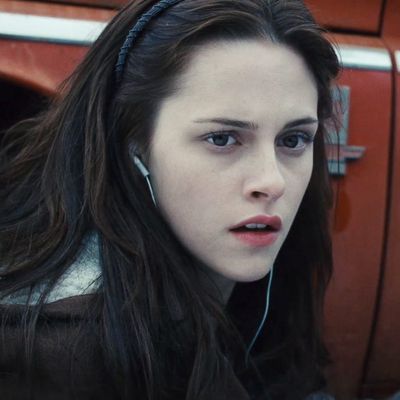
Every few weeks for the foreseeable future, Vulture will be selecting one film to watch as part of our Friday Night Movie Club. This week’s selection comes from Vulture social media editor Wolfgang Ruth, who will begin his screening of Twilight on April 23 at 7 p.m. ET. Head to Vulture’s Twitter to catch his live commentary, and look ahead to next week’s movie here.
Maybe it was the glint of orange hidden under years of rust and grime on Bella Swan’s 1953 Chevy pickup truck. Maybe it was the way Bella (played by Kristen Stewart) sprinted through Rome in horribly rendered slow motion in New Moon — right on through a fountain and past a wave of witnesses cloaked in red — to save her vampire boy toy Edward Cullen from the thirsting, villainous Volturi. Maybe it was even the fact that you can literally stay at the Swan’s Twilight house via Airbnb that fully sold me on the franchise. But, if I’m being fully honest, it was the first film’s very first line of dialogue, spoken with equal parts vulnerability and campy, clueless cheese: “I’d never given much thought to how I would die.” Talk about a bang!
Reader: I think about Twilight to a disturbing degree, and have since its cinematic debut in 2008. Grossing $408.4 million worldwide, the film very quickly magnetized tweens and Twihards between two inevitably star-crossed, polar-opposite lovers: one warm-blooded, one cold. The first of five films, this saga starter filled with vampires, werewolves, and loads of soapy drama followed our protagonists as they fell so deep in love for each other that it became (metaphorically) blinding.
Even now, 13 years later, Twilight’s magic is timeless. In the past year alone, the movie has invaded even more of my spare brain space thanks to its newly amassed cult following, now forever littering the internet with TikToks, memes (tattoo “Bella, where the hell have you been, loca?” on my thigh), a dedicated, unhinged Twitter account, and heated conversations about Bella’s terrible but celebrated facial expressions, to say nothing of the endless dissections of the metal fan that carries the coveted scent of her blood to Edward’s nose (resulting in a memorably cheesy scene in which Robert Pattinson’s septum crinkles and he attempts to switch science classes to escape an inevitable obsession with the smell). Twilight is ridiculously silly, but at the same time, ridiculously iconic.
Citizens of the internet have fallen back in half-ironic love with Twilight because it’s become proven camp-cringe royalty. To me, settling down with Twilight hits the same pleasure centers as watching a bad reality TV show, one that’s completely neurotic, never-ending, and somehow oddly comfortable all in the same episode. Twilight does exactly what it promises to: It entertains, no matter how sincerely you enjoy it or not. More than a decade after its original release (during a global pandemic, no less), this shimmery piece of cotton-candy cinema has brought me — and my mother, my co-watching confidant — an emotion as close to joy as I could find, as well as a sense of relaxation that scratches the same itch ASMR does. When you say camp, most people see Death Becomes Her, Queen of the Desert, or Spice World (please, someone, get this on a streaming service). When I hear camp, I think of Bella and Edward in biology class — the couple’s true, first encounter — as they exchange weird, uncomfortable-looking glimpses before winning that day’s assignment’s prize: the golden onion. Edward tries (and fails) to read Bella’s empty thoughts, and then, after asking Bella about the weather, they say it: “ANAPHASE! PROPHASE! … Do you mind if I check?” Frankly, this decade’s cinema could never.
Where thousands of young fans once lined up for midnight screenings, now Twilight’s lasting appeal lies in not reading between its lines but simply skimming its blissfully thought-free surface. So many of its choices stand the test of time for all the wrong reasons: a bedroom with no bed but a complete discography of classic movies from the ’50s; vampires who only play baseball (of all the sports …) during a thunderstorm (practical); dating a boyfriend who will climb a giant tree in the center of a forest in a small town called Forks with his bare hands while calling you “Spidermonkey” (hot …?); a Gothic solo piano moment; a field trip to a compost greenhouse in the middle of nowhere; and, of course, Bella cosplaying as the Nancy Drew of covens as she investigates Edward’s origin and characteristics (oddly cold skin, insane speed, avoidance of sunlight) to figure out he’s actually been 17 years old for “a while” now. And let’s also not forget Bella Swan and her dad Charlie’s legendary diner scene, right as she moves from Phoenix to Washington, and — in awkward silence — when she pretends to squeeze ketchup on her hamburger, when, no! In the riveting scene, she clearly does not squeeze the bottle of ketchup at all! Not even Drag Race could pull off an acting challenge this deliciously tasteless.
Jokes aside, Twilight was a queer sensation for me. Onscreen, I saw bulked bodies and muscles and dark, impassioned romances, led by two chiseled men battling demons to win the girl. Is this my Snyder Cut? It was the question on everyone’s lips for years: Team Edward or Team Jacob? Even before I came out as gay, I fantasized about the then–Robert Pattinson and Taylor Lautner characters. Who would I choose? (That’s easy: both.) It helped my Catholic middle-school self somewhat normalize an identity that, back then, I feared to admit or engage in. This movie was a safe space for indulgence. Now, watching Twilight, I see something different: glittering skin, poreless faces, and actors plucked for the gods that so many people, myself included, absurdly lusted over, this creeping, clichéd love story presenting these two men as meat. Readers: We ate, and, Jacob Black’s six-pack saved me.
So, to ring in Kristen Stewart’s birthday month (a holiday, don’t fight it), join me as I serve as your camp counselor, helping to guide you through Twilight’s most egg-on-the-face moments for this week’s Vulture Movie Club.
Twilight is available on Amazon Prime Video, Showtime, YouTube, iTunes, and Google Play.
If you subscribe to a service through our links, Vulture may earn an affiliate commission.


